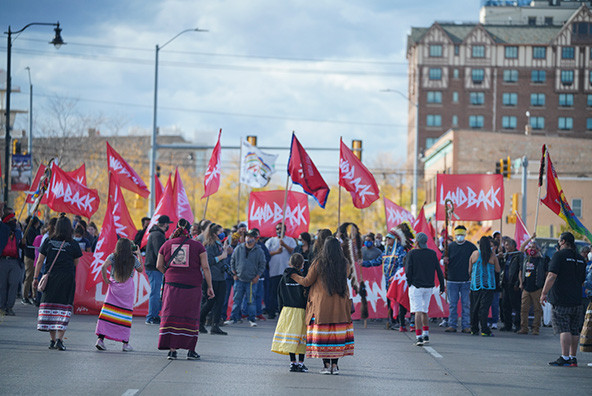 (Photo by Willi White/NDN Collective)
(Photo by Willi White/NDN Collective)
What would it mean to “decolonize” philanthropy? Language matters. As Eve Tuck and K. Wayne Yang have powerfully argued, “Decolonization is not a metaphor,” and shouldn’t be used to describe anything but fundamentally dismantling white supremacy. That means centering oppressed perspectives, supporting the rematriation of land, redistributing resources, shifting power and decision making, and healing through reckoning. And when it comes to philanthropy, decolonization cannot include coddling white fragility, but must mean truly transforming the ways we go about our business. While we are heartened by the proliferation of “trust-based philanthropy” practices and believe great strides have been made in redefining relationships between philanthropy and BIPOC social justice organizations, we must guard against co-opting and mischaracterizing decolonization within philanthropy and beyond.
Our intention for this piece, therefore, is not to add to the rhetoric, but to invite funders and partners to learn to do this work collaboratively for generations to come. As James Baldwin put it, “Not everything that is faced can be changed, but nothing can be changed until it is faced.”

Change is not possible without facing the truth. And the truth is that the philanthropic industrial complex is the result of unfettered capitalism that generated ill-accumulated, hoarded wealth through generations of violence, exploitation, and extraction of the land. Philanthropy could not exist without centuries of exploitative capitalism, colonization, genocide, slavery, and white supremacy coupled with an economic practice that holds these tenets as unalienable.
According to a 2019 report, from 2002 to 2016, large US foundations gave an average of 0.4 percent of total funding to Native American communities and causes (even lower for Indigenous-led organizations). But even this inadequate amount dramatically fluctuated throughout the time period. As First Nations Development Institute reports, the “consequences of this volatility for community organizations is instability in predicting revenue, which then leads to instability in organizational growth, development, and programming, as well as other negative organizational outcomes.” Short, annual grant-cycle projects cannot address the systemic challenges that Native American communities confront, providing just enough resources for careers to be spent toiling in service without achieving solutions. Limited support creates one- or two-year projects, with no real sustainability nor the ability to respond to changing community needs and priorities.
In short, anemic philanthropic and investment partnerships leave too many BIPOC organizations advancing false solutions brought forth by foundations instead of responding to their communities’ most pressing needs.
This is unacceptable. Philanthropy must center those hit the hardest by systemic injustice, prioritizing BIPOC-led grassroots organizations, and looking to Indigenous-led organizations for leadership, such as NDN Collective, Native Americans in Philanthropy, and International Funders for Indigenous Peoples. Doing so will not be easy, but change is needed yesterday, won’t happen tomorrow, and requires people in positions of institutional power to reimagine their relationship to themselves and each other.
Here’s how:
1. Disrupt Paternalistic Grantmaking Practices
It’s not just who you fund, but how you fund. For example, NDN’s grantmaking reflects the values and ethics of decolonization that run throughout our organization, and we consider our grantmaking an extension of our activism, redistributing resources through a practitioner and community lens. What's more, our programs are iterative and dynamic, responding to the needs we hear in our communities, from our Tribal Leaders, from our people. By the same token, Libra has slashed administrative burdens and provides multi-year, general support grants, because we believe that organizations know what to do with resources and don’t need to check in about every move. The Trust-Based Philanthropy Project and Justice Funders are wonderful funder communities committed to doing the hard work of addressing power imbalances between funders and grantees. We also love these guidelines from Native Voices Rising.
2. Move More Money
The bare minimum distribution required by tax laws reinforces economic oppression and perpetuates inequality and structures of white supremacy. In addition to going beyond the 5 percent minimum payout required by tax laws, funders can utilize impact investing, PRIs, and other strategies to activate the 95 percent of their wealth locked up in archaic power structures to truly help create community wealth and exemplify trust-based philanthropy. There are many organizations like Seed Commons, The Grove Foundation, and Kataly Foundation that are working to address the huge unmet need in communities of color for investment capital that is patient and low-interest, and that can be used to fund innovative ideas while not relying on antiquated underwriting or over collateralization. Others should consider actively moving into spend down, to redistribute resources to those actually doing the work.
3. Go Beyond the Land Acknowledgment
Land acknowledgments are an essential practice, reminding us of who the original inhabitants are of the land we inhabit, as well as emphasizing the significance and sacredness of land itself, and the brutal settler forces that created our current reality. But be careful: land acknowledgments should prompt larger conversations about our connection to the earth and resources. They ring hollow when they are not coupled with intention and action.
Some guiding questions to consider: who are the Native people in your area and what are their struggles and triumphs? Are they represented in your organizational leadership? Do you have a relationship with them? Are there Native-led organizations in your community organizing for a land tax (such as the Shuumi land tax in Oakland) that you can support? Where do your water, electricity, gas, and other daily utilities come from and how do they get to your home or office?
If these questions resonate with you and your organization, your first step should be to reach out locally, to BIPOC organizations and leaders in your community, respect their time and compensate them for their experience and knowledge, and most will be happy to hear you're taking action towards being more than a fair-weather ally, becoming an accomplice in deconstructing white supremacy.
4. Create Space to Feel
You don’t need to see the stats in philanthropy to know that it is overwhelmingly white (though if you want to, here’s a good article to get you going). But whether you are or not a person of color in philanthropy, and whether or not your foundation is in a practice of trying to do better, the place you work is rooted in racial capitalism. Full stop. It can be painful to look at that for what it is, but the better we get at naming it and taking care of each other, the more possible it will be to dismantle and build new infrastructure that works for everyone.
Funders and philanthropy professionals need to take time collectively to illuminate dark corners, hold each other close, and practice self-care so you can sustainably be a part of this fight. It is also important to fund this same work for the organizations you partner with (see, for example, the Healing Justice report by Astraea Foundation). As Edgar Villanueva writes, in Decolonizing Wealth, “Settlers and their descendants have to grieve the lives of their ancestors, the culture that made their acts of domination and exploitation even imaginable, possible, and accessible. ... Generations down the line must grieve the culture of the present, which perpetuates the colonizer mindset of domination and exploitation.”
5. Stop Siloing People
Human beings experiencing systemic injustice cannot be neatly categorized for the convenience of funders. While Libra uses program areas to organize grants for a number of reasons (staff expertise and holistic movement analysis, for example) we understand that injustice does not exist in a vacuum. Solutions cannot either.
For example, consider the devastating relationship between gender violence, climate injustice, and economic security in Native communities. The Coalition to Stop Violence Against Native Women states that the US Department of Justice found that American Indian women face murder rates that are more than 10 times the national average. In Montana, Native citizens are 6.7 percent of the population, yet between 2016-2018, they made up 26 percent of the state’s missing persons reports. (And these numbers are severely undercounted). Growing research suggests that the proliferation of the fossil fuel industry and subsequent “man camps” play a brutal role in Missing and Murdered Indigenous Women (MMIW). Studies show that when men from other parts of the country are brought in to temporarily staff pipelines, this leads to increased sexual violence and sex trafficking. Due to a lack of well-paid employment opportunities, men travel to Tribal regions for these opportunities and make Indigenous communities vulnerable due to lack of jurisdiction and Tribal oversight. It’s impossible to unbraid extractive industry and gender violence and, as funders, we must ensure we do not perpetuate this delusion.
A more place-based, in-depth look at this issue can be found in this 2017 report by Kathleen Finn, Erica Gadja, Thomas Perin, and Carla Fredericks.
6. Put Relationships First and Move at the Speed of Trust
Trust is earned, and it happens over time, with consistency and follow-through. Funders must listen deeply to their grantees, not prescribe from their own experience. No single individual or organization can be an expert on everything, so we need to build a culture of tapping into the wisdom of experts with lived experience, in this case, those doing the work at the ground level. This can only happen when and if you are in a relationship, without it, it’s extractive. The organizations we work with are changing the hearts and minds of people every day and our relationships ought to reflect the behavior we want to see in the world. Read and practice Emergent Strategy by Adrienne Maree Brown if you haven’t already!
7. Practice Reciprocity and Create Access
Honor your grantee partners’ time by being in reciprocity with one another. That could mean offering financial compensation for their wisdom, connecting them with other funders, or supporting a campaign or announcement. There are many ways—ask. And don’t forget to cite your teachers! Did you learn something from a grantee that’s now a part of your strategy? Give them a shout-out. We love these guidelines about the radical praxis of citation from Cite Black Women. With that in mind, Libra is honored to learn about putting these theories into practice with guidance from partners like NDN and Indigenous Environmental Network.
Beyond Buzzwords
NDN and Libra believe in the power of people and community to create a world that is prosperous, safe, equitable, and just for all people and the planet. But we can't get there by following the typical philanthropy playbook and reciting industry buzzwords from the exclusionary practices we are looking to dispel. The opportunity is now to invest in the power of people, break hierarchical power systems, challenge colonial constructs that exploit and concentrate for the benefit of a few while burdening the rest of us with unstable governments, environmental disasters, and economic obliteration.
Let's get comfortable being uncomfortable and deconstruct the colonial settler status quo. The solutions for a better world are there, and it will take resources, people, experience, motivation, time, patience, and vision. But most of all it will take all of us to do our part.
Support SSIR’s coverage of cross-sector solutions to global challenges.
Help us further the reach of innovative ideas. Donate today.
Read more stories by Michael Johnson & Angie Chen.

